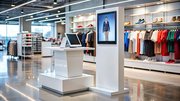Article
PCI compliance dominates talk at NACStech
Data security is on the minds of retailers, and one of the themes of this year's show was "making scary go away."

June 14, 2009 by David Drain
I attended the NACStech show recently held in Grapevine, Tex. and PCI compliance was certainly on the minds of the attendees, exhibitors and show management. Indeed, seven workshop sessions pertained to PCI.
For those not familiar, PCI stands for Payment Card Industry, and when PCI is mentioned, people typically mean compliance with the PCI Data Security Standard (PCI DSS). Retailers, including convenience stores, have been scrambling for months to understand the PCI DSS and make sure they are compliant.
Compliance is mandated by the payment card brands such as Visa and MasterCard. In simple terms, the standard is to protect consumer's credit card data to prevent fraud. Secure networks, encryption, restricting access to cardholder data and having a security policy are all involved.
Who has to comply? According to the PCI Security Standards Web site, "All entities that transmit, process or store payment card data must be compliant with PCI DSS."
Jeff Lenard, vice president of communications for the National Association of Convenience Stores (NACS), which produces NACStech, said one of the themes of the show was "making scary go away." Attendance was down, as has been the case for most trade shows and conferences this year, but Lenard estimated the attendance to be about 1,000 with 90-plus exhibitors.
Lenard said that the retailers have had to address two scary topics at this year's event — credit card fraud and social engineering. Social engineering, according to Wikipedia, "isthe act of manipulating people into performing actions or divulging confidential information." Lenard talked about how security breaches can really hurt your brand.
When asked about the impact of digital signage at c-stores, Lenard said, "Signage at the pump is huge. Changing a sign manually takes time and money." Also, you can "show in-store promotions and boost sales."
When asked about kiosks, he commented that using "kiosks for ordering food takes labor out of the question." As to other advantages, he pointed out that younger people are used to it, you can offer service in multiple languages and "kiosks always know to upsell."
From the show floor
Citizen's booth featured one of its latest products, the CT-S2000 Memory Printer with 32 MB of memory. It can print out journal data on demand, is six times faster than impact printers, have fewer moving parts, comes with a three-year warranty and there are no ribbons to buy.
Dresser Wayne, manufacturer of fuel dispensers, rolled out pay-at-the-pump in 1986. The big push this year is on security. On May 15, Dresser Wayne announced the iX Pay Secure Payment retrofit kits for Dresser Wayne and Tokheim fuel dispensers. The kits help retailers comply with the PCI Encrypting PIN Pad (EPP) requirements.
Gilbarco Veeder-Root had several interesting products on display:
- An Express Ordering food kiosk, using IBM Anyplace Kiosk hardware
- Intelligent Device Management (IDM), which consolidates remote monitoring of all devices and gives a retailer the ability to monitor anything in the store: heating, air conditioning, refrigeration, even the back door. One can track how many people are coming and going, manage lighting levels and generate alarms when something's amiss.
- Applause Media System, a screen housed within the fuel pump itself, rather than on top, featuring rich content and the ability to print coupons on demand. New to the Applause system is the addition of video and audio.
NEC featured several products: its Twin POS 5500, digital signage and tablets for mobile communication between stores and within stores. For example, headquarters can notify stores if a product has been recalled. In addition, the tablet serves as an inventory management tool. NEC also promoted the fact that it provides business and IT consulting.
Working with Ingenico, Orpak makes retrofit pay-at-the pump devices for PCI compliance.
The Pinnacle Corporation, which makes automation technology for c-stores, had a clever sign in their booth that read: "There are only 3 certainties in life: Death. Taxes. PCI Compliance." What also caught my eye was a food ordering kiosk. Pinnacle makes kiosk software to backend software so it ties into the POS.
Radiant Systems, a manufacturer of hardware and software for POS, had on hand a new 17-inch all-in-one kiosk terminal featuring an encrypted magnetic card reader and dual core chip. James Hervey, in global product marketing, also pointed out that the unit is passively cooled. Radiant has a solid state version (no moving parts) and makes an outdoor version as well.
Also in Radiant's booth was Intelio, demonstrating its activation unit for car washes. At $12,000, John Carroll, president & CEO, said that his system was the same cost as a typical car wash activation unit, but featured full motion video and remote management for the operator.
VeriFone's MX800 series standalone terminals and PIN pads can be used for various applications, such as movie rentals, price checkers, applications for credit and surveys. All terminals are PCI compliant and the MX870 combines color, video and digital sound with secure payment capabilities.
Wincor Nixdorf featured its cash management systems. Chad Wagner of Wincor pointed out that their product offers cash recycling, a fast bulk note acceptor and one slot for checks and cash giving the operator convenience and security. The machine can be configured to face the customer or the employee. By having a cash recycler, Wagner said, a store can reduce the amount of cash kept in the store by as much as 60 percent. "It could eliminate the cash drawer," he said.
 ChatGPT
ChatGPT Grok
Grok Perplexity
Perplexity Claude
Claude




